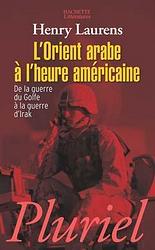If the imminent arrival of a new President of the United States is expected to change, perhaps less profoundly than generally thought, the “American hour” in the Near and Middle East, the latter will nonetheless remain an intrinsically complex region. This is due to two fundamental reasons according to the interpretation of the book written by historian Henry Laurens, recently reissued by Hachette Littératures. How could the countries in this area maintain a specific political culture which, according to the author, “constantly integrates foreign interventions” while basing their political system on “balances that ensure a certain stability despite periodic convulsions”? Perhaps this is what the General called “a complicated Orient”?

The title makes it clear: the numerous historical reflections already published by the author do not make him a novice in this field and thus allow him not to trouble himself with a lengthy introduction on the contemporary Arab-Muslim world. Everything begins on the day after the Gulf War which forced Saddam Hussein’s troops to withdraw from Kuwait, invaded a few weeks earlier. The experience and field knowledge of the Professor at the Collège de France allow him to display a double expertise: a first approach ratione materiae thus deals with the major issues that have marked the Middle East in recent years: the laborious launch, the vicissitudes, and the hopes constantly dashed of the Oslo I and II processes which were to ensure peace between Israelis and Palestinians up to the details of the ultimate failures of the Camp David meeting between Barak and Arafat. Perhaps, let us note in passing, with a relative leniency from the author on sometimes under-estimated Palestinian responsibilities: notorious corruption of Yasser Arafat and the incapacity of the PLO militiaman to assume the true clothes of a Head of State. The militaro-diplomatic genesis of the “Greater Middle East” project conceived by the Bush Administration or the conditions for developing the “road map” to compensate for the failures of Israeli-Palestinian negotiations complete this non-exhaustive list. A second part ratione loci offers a detailed study, particularly well-supported – academics as well as demanding lay readers will appreciate the integration of official documents and tables in the body of the work – of the countries in the region whose political, economic, and social developments over these years are literally scrutinized: uncertain transitions in Syria after the disappearance of Hafez El Assad and the quickly closed parenthesis of a “Damascus Spring” by his second son Bashar, last-minute succession change in the Kingdom of Jordan, as timid as it is inevitable an opening to new generations of Saudi power to address the country’s financial difficulties which call into question the nature of the traditional allegiance link, maneuvers of Saddam Hussein that Henry Laurens strangely calls “capacities” without further explanation which indeed squander the French and Russian efforts to convince the Security Council to lift the embargo – to the point that a French Ambassador to New York will one day irritably question Minister Tarek Aziz about the true intentions of the Iraqi dictator –, the paroxysmal rise of the Lebanese crisis up to the assassination of former Prime Minister Rafic Hariri, in short, nothing is missing in both the description and analysis of events that will give any specialist in this area the feeling of reliving them live.
With in the background what the former Director of the Middle East Studies and Research Center in Beirut qualifies as “American choices.” At the risk of leading the reader to believe in some “invisible and conspiratorial hand” that fortunately, the final chapters on “American difficulties” easily refute. Despite these skillfully and precisely presented facts, the author finally sticks to cautious conclusions: the evolution of the Arab East will simultaneously depend on the resolution of the “Palestinian and Iraqi dramas” which “strongly involve the international community” but also on the establishment of political systems offering civil “participation” and “alternation” of power. Desirable prospects which at this stage remain – regrettably – mere working hypotheses.
Henry Laurens, “The Arab Orient at the American Hour, From the Gulf War to the Iraq War, Coll. “Pluriel”, Hachette Littératures, 2008, 451 p., 11 euros


